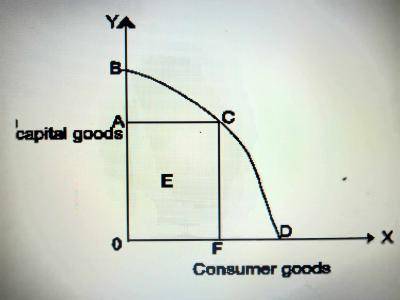
Economics Questions and Answers
Economics questions and answers to help you prepare for JAMB, WAEC, NECO, Post UTME and job aptitude tests or interviews.

Economics questions and answers to help you prepare for JAMB, WAEC, NECO, Post UTME and job aptitude tests or interviews.

From the graph below, Point "E" shows--------------
Product inefficiency
Product efficiency
Productive efficiency
Allocate efficiency
Correct answer is A
Point 'E" inside the graph indicates it is technologically inefficient" , Underemployed" or wide spread unemployent" or resources are not fully utilized or production inefficient"
A persistence rise in the prices of inputs will lead to
Cost push inflation
Demand pull inflation
Hyperinflation
Stagflation
Correct answer is A
Cost push inflation is inflation caused by an increase in prices of inputs like labour, raw materials etc.
When a generalization is made based on observed facts, it is
Inductive reasoning
Normative reasoning
Theoretical reasoning
Deductive reasoning
Correct answer is A
Inductive reasoning is a process by which a person makes a generalization based on specific, individual experiences. This process begins with observation.
The economies of West African Countries depend majorly on
Primary product
Secondary product
Tertiary product
Manufacturing product
Correct answer is A
The economies of West African Countries depend majorly on primary products. Primary products refer to goods that are available from cultivating plants or by extracting minerals from the earth. These include agricultural products, mining products, and other raw materials. West African countries like Nigeria, Ghana, and Ivory Coast are known for their export of primary products like oil, cocoa, and gold respectively.
Which of the following would not be a reason for a government to impose a quota on imports?
To support strategic industry
To prevent dumping
To decrease tax revenue
Employment oppourtunity
Correct answer is C
Reasons for the imposition of tariffs or restriction of trade are: To protect infant industries, generation of revenue, to prevent dumping, to improve balance of payment deficit, employment generation, to promote self-sufficiency, political motive, to protect strategic industries etc.